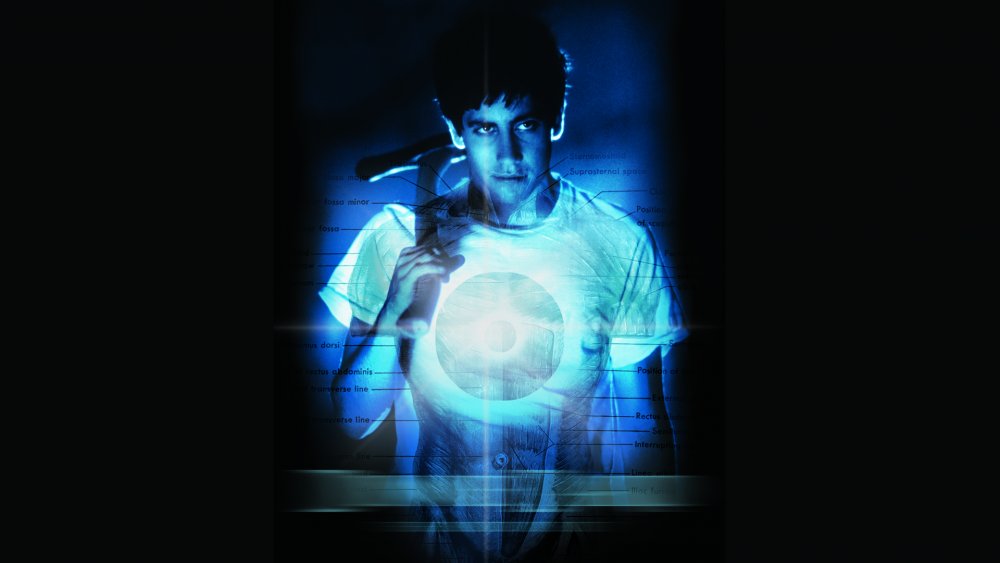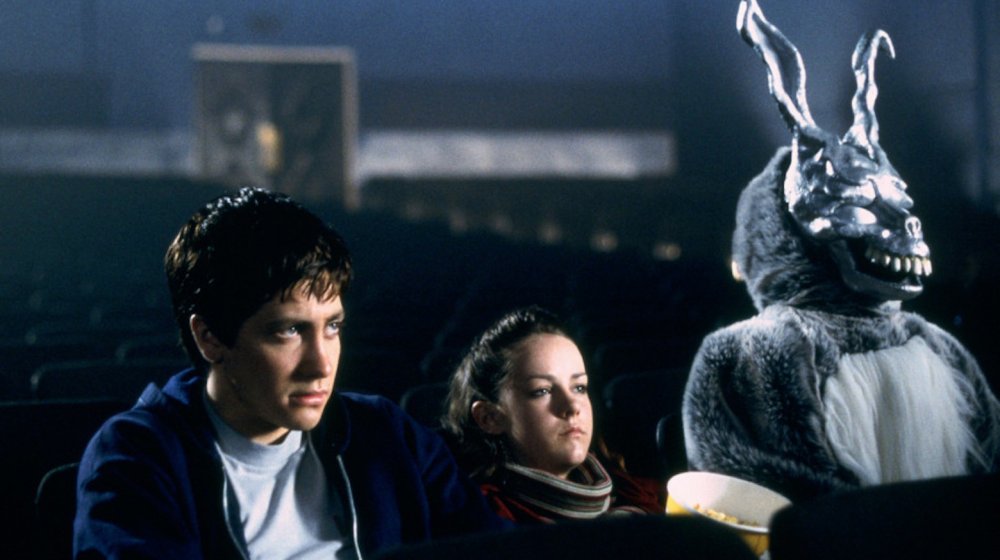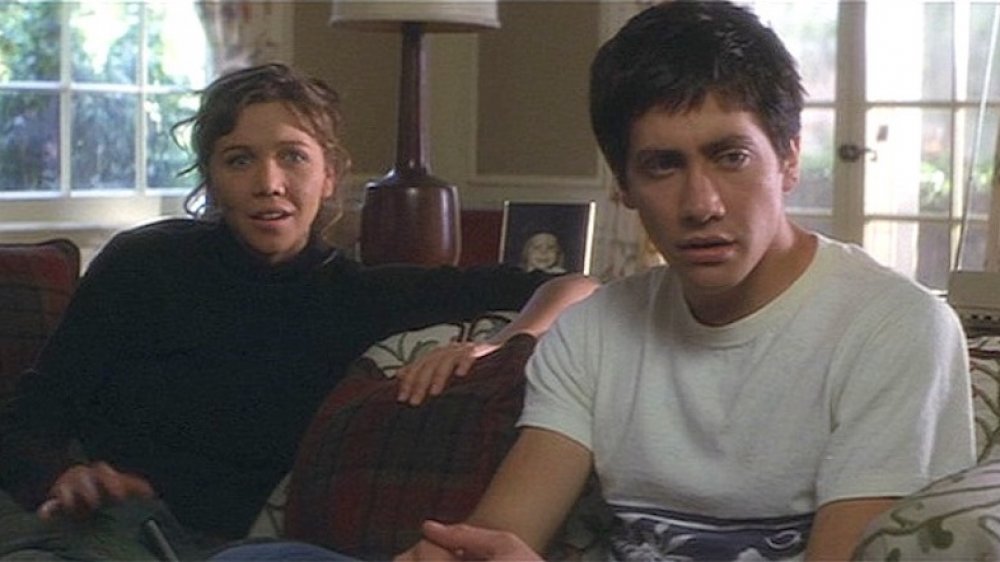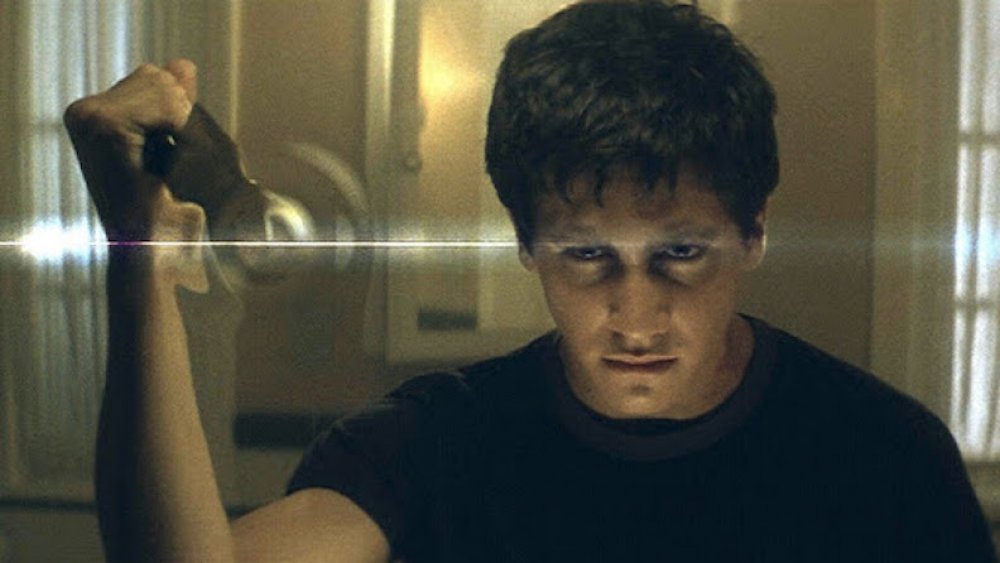Donnie Darko Bombed At The Box Office. Here's Why
Every year, hundreds of movies are released, hoping to make big bucks at the box office. However, if pop culture history proves anything, it's that there are no sure things in cinema: even the most certain blockbusters can fall flat on their faces. And some movies, such as Richard Kelly's mind-bending Donnie Darko, are born with tragedy in their blood.
Released to very little fanfare in the fall of 2001, roughly a month after 9/11, Donnie Darko was initially tabbed as a stylish, brainy little sci-fi thriller with awards season potential. That buzz was largely thanks to Kelly's wildly original screenplay, and the film's impressive young cast, fronted by a baby-faced Jake Gyllenhaal. Nonetheless, despite strong reviews, Kelly's feature debut still fell well short of expectations when it hit theaters. In the ensuing decades, Donnie Darko has become a legit cult sensation, and a midnight movie staple, but its original theatrical run was decidedly less impressive on the financial front, with its initial $2.9 million box office take (against a $6 million budget) easily earning it the label of box office bomb.
Here's why Donnie Darko failed to connect with audiences back in 2001.
Donnie Darko was too cerebral, too confusing, and too soon after 9/11
For all of Donnie Darko's style, intellect, and narrative ingenuity, it's not an easy movie to embrace. In fact, the film gives new meaning to the term "cerebral cinema," with its doom-and-gloom tale of a deeply troubled teen (the titular Donnie) embarking on a schizophrenic spiritual journey, that covers everything from eighties politics and wormhole theory, to mental instability and religious zealotry. These aren't lighthearted topics, but Kelly further complicates matters further by having Donnie led on his trippy journey down the metaphysical rabbit hole by an actual rabbit — or rather a human dressed in a truly unsettling rabbit costume, complete with a grotesque mask guaranteed to haunt your dreams.
Kelly's script attempts to temper the insanity with a bit of teen angst, drama, and romance, but ... well, even those would-be narrative sojourns are wildly complicated in their own right. And needless to say, the film's post-9/11 release obviously didn't help, as the traumatized audience just was not ready to embrace such a fatalistic, atmospherically dense, and patently bleak piece of work — especially not one where the narrative revolves around a plane crash, of all things. That aspect, on its own, is often considered to be precisely what sunk the film, as the Verge writes.
Either way, audiences had no idea what to make of Donnie Darko when it hit theaters. Even today, many people still don't. As Seth Rogen, who co-starred in the film, infamously told Collider in 2007, "I didn't get it back then, and still don't, but had a good time."
Donnie Darko's stars weren't yet big names
Disorienting narrative aside, one look at Donnie Darko's casting sheet would be enough to make one think it was destined for box office glory, in spite of its intensely disorienting narrative. Not only did the film star Jake Gyllenhaal and Seth Rogen, but it also featured supporting turns from Maggie Gyllenhaal, Jena Malone, Noah Wyle, and Drew Barrymore. It even boasted fascinating cameos from screen icons like Katharine Ross (The Graduate, Butch Cassidy and the Sundance Kid) and Patrick Swayze (Dirty Dancing, Point Break).
However, a closer look reveals why this cast didn't push people into theaters. Fact is, in 2001, the Gyllenhaals were far from established Hollywood players. Donnie Darko was Seth Rogen's first movie. And the star power of both Ross and Swayze had, by 2001, all but faded entirely. While Drew Barrymore was already an icon in her own right, Jena Malone's star was rising, and Noah Wyle was still fronting NBC's runaway hit ER, these actors were little more than supporting characters and/or cameos in Donnie Darko, while the lion's share of the film's narrative went to a group of then-unknowns.
Imagine trying to market Donnie Darko to the masses, in a pre-Donnie Darko world
While, in retrospect, Donnie Dark certainly helped put its hot young cast on the path to cult stardom, the audiences of 2001 certainly weren't rushing to buy tickets to the new Jake Gyllenhaal flick. That meant name recognition wasn't something the marketing team could bank on, to make what was already a bewildering, genre-jumping film more palatable to the masses. It was nearly impossible to gauge the right market for it. One look at the original trailer shows how they fell back on painting the film as more of a heady teen scream flick (ala Drew Barrymore's own Scream) than the atmospheric, metaphysical nightmare it is. As a result, any teens who did show up to Donnie Darko, expecting the jump scares and slasher thrills it was marketed with, were probably not enthused by the film's piercing intellect and ethereal mood. Mainstream moviegoers, meanwhile, couldn't be bothered to make heads or tales of its puzzle-box pleasures.
Despite how much of a cult classic Donnie Darko has grown to become, and the positive critical reception it garnered at release, it's completely understandable why initial word of mouth was mixed, at best. The film's theatrical run was brief, and tragically underwhelming. Luckily, in the years since, Donnie Darko certainly found its audience.



